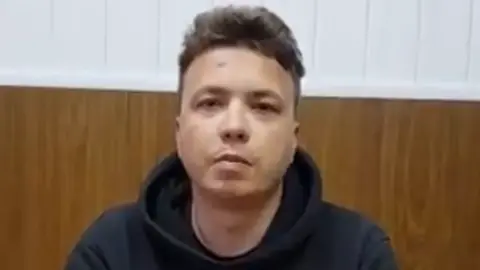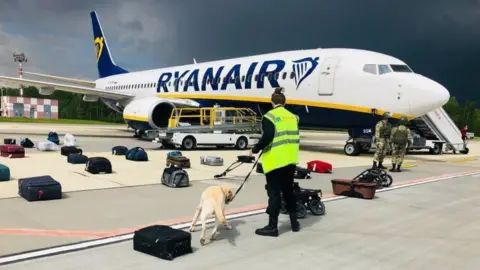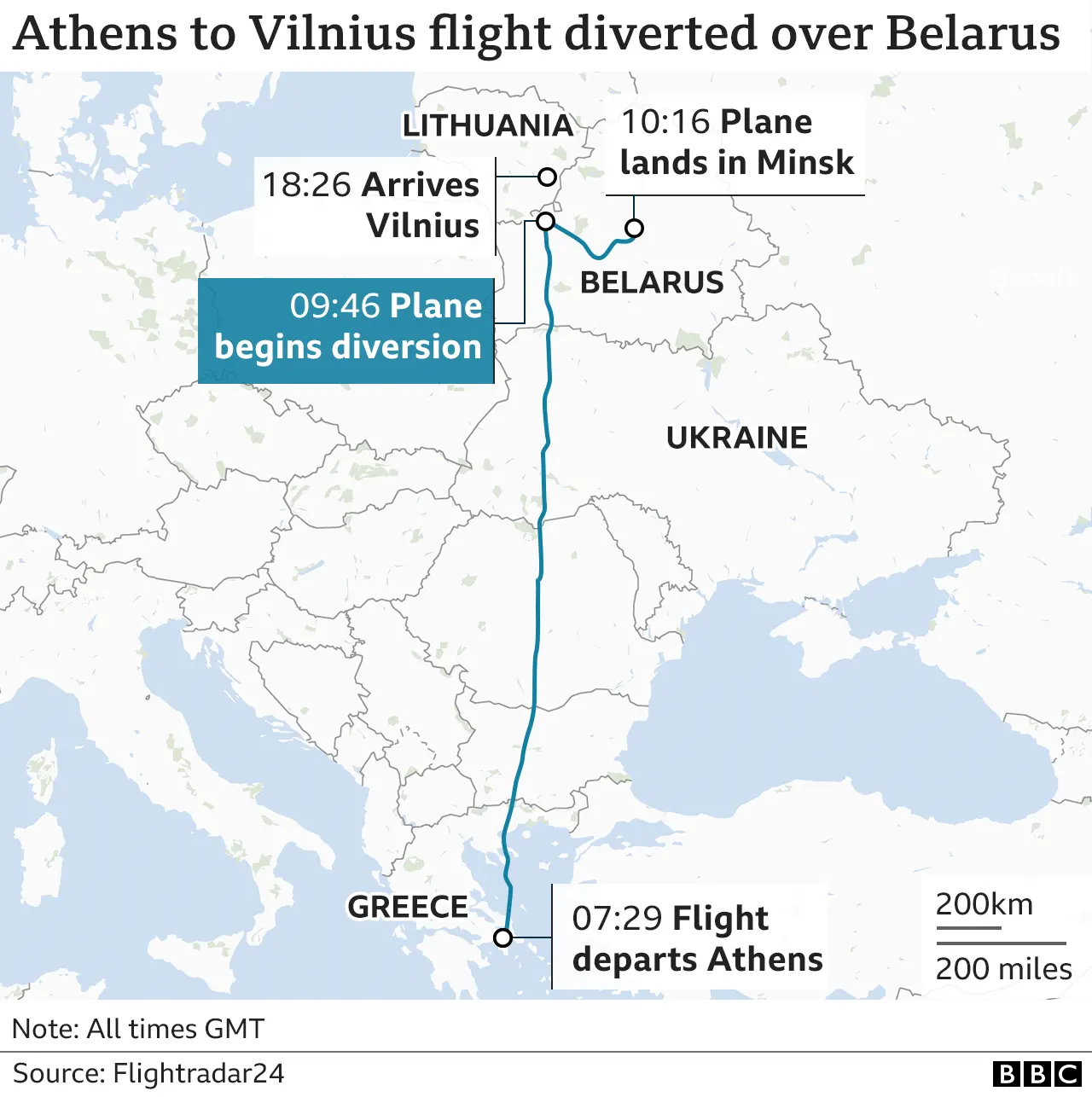EU agrees new Belarus sanctions after plane arrest
The EU has decided to ban Belarusian airlines from European skies after a flight was diverted to Minsk on Sunday and a dissident journalist arrested.
At a meeting in Brussels, the leaders of the 27 member states also told EU airlines not to fly over Belarus, and promised further economic sanctions.
Roman Protasevich, 26, was on a flight from Greece to Lithuania which was rerouted over a supposed bomb threat.
Western countries accused Belarus of hijacking the Ryanair plane.
Belarus authorities on Monday released video of Mr Protasevich that appears to have been recorded under duress since his detention at Minsk airport.
In the clip, the journalist said he was in good health and seemingly confessed to crimes he had been charged with by the Belarusian state.
But activists, including the country's main opposition leader, criticised the video and suggested Mr Protasevich was under pressure to admit wrongdoing.
US President Joe Biden described the actions of the Belarusian authorities as "outrageous", saying they were "shameful assaults on both political dissent and the freedom of the press".
Mr Protasevich's father has told the BBC he fears his son may be tortured.
Dmitri Protasevich said on Monday he was "really afraid" of how his son would be treated by the authorities in his home country.
"We hope that he will cope. We are afraid to even think about it, but it's possible he could be beaten and tortured. We are really afraid of that," he said in a video call.
"We are really shocked and really upset," he said. "This sort of thing shouldn't be happening in the 21st Century at the heart of Europe.
 Nexta
Nexta"We hope that the whole international community, including the European Union, will put unprecedented pressure on the authorities. We hope the pressure will work and the authorities will realise they've made a really big mistake."
Major European airlines have already begun rerouting flights away from Belarusian airspace.
The UK has suspended the operating permit for Belarusian state airline Belavia, and EU leaders have called on member states to take similar action.
In a separate development on Monday, Belarus expelled the Latvian ambassador and other diplomats after the Belarus national flag was replaced by a historical red-and-white flag used by the opposition at the Ice Hockey World Championships in the Latvian capital Riga.
Latvia responded by expelling Belarus diplomats.
How did events unfold on Sunday?
Belarus sent a fighter jet to force Ryanair flight FR4978 - which had departed from the Greek capital, Athens, and was bound for Vilnius in Lithuania - to land, claiming there was a bomb threat. It touched down in the capital Minsk at 13:16 local time (10:16 GMT) on Sunday.
Police then took Mr Protasevich away when the plane's 126 passengers disembarked. The activist, who witnesses said was "super scared", was arrested along with his girlfriend Sofia Sapega.
Ms Sapega's mother told the BBC that the 23-year-old had been taken to a Minsk jail, adding that the last word she managed to write on her WhatsApp messaging account was 'Mummy'. The accusations against her are unclear.
 HO via EPA
HO via EPABelarus is the only European country that still executes prisoners, and witnesses said Mr Protasevich told fellow passengers he feared he would face the death penalty.
Three other passengers did not reach the plane's final destination in Vilnius. Ryanair chief executive Michael O'Leary said he believed some Belarusian KGB agents also departed the plane at Minsk, but this has not been independently verified.
Belarus said the flight had been diverted because of a bomb threat from the Palestinian militant group Hamas. A senior transport official read a letter to reporters that he claimed was from the militant group.
"If you do not fulfil our demands, the bomb will explode over Vilnius," it said.
But Hamas has denied any involvement. The group has no history or known capability of mounting operations outside Israel and the Palestinian territories. German leader Chancellor Angela Merkel said the Belarusian claim was "completely implausible".


The incident has drawn sharp condemnation from across the world, with countries urging the immediate release of Mr Protasevich and a full investigation.
Dozens of Belarusian officials, including President Alexander Lukashenko, are already under EU sanctions including travel bans and asset freezes, imposed in response to the repression on opponents.
State media in Belarus said Mr Lukashenko, who has ruled the country since 1994, personally gave the order for the plane to be diverted.
The 66-year-old leader has cracked down on dissenting voices since winning a disputed election last August. Many opposition figures have been arrested, while others fled into exile.
Who is Roman Protasevich?
Mr Protasevich is a former editor of Nexta, a media operation with a Telegram channel. He left Belarus in 2019 to live in exile in Lithuania. From there he covered the events of the 2020 presidential election, after which he was charged with terrorism and inciting riots.
Nexta played a key role for the opposition during the vote, which was won by Mr Lukashenko and is widely regarded as rigged. It has continued to do so in its aftermath, particularly with the government imposing news blackouts.
Mr Protasevich now works for a different Telegram channel, Belamova. He stepped in to write for it after blogger Igor Losik was arrested by the Belarusian authorities in June last year.

Belarus: The basics
Where is Belarus? It has its ally Russia to the east and Ukraine to the south. To the north and west lie EU and Nato members Latvia, Lithuania and Poland.
Why does it matter? Like Ukraine, this nation of 9.5 million is caught in rivalry between the West and Russia. President Lukashenko has been nicknamed "Europe's last dictator" - he has been in power for 27 years.
What's going on there? There is a huge opposition movement demanding new, democratic leadership and economic reform. The opposition movement and Western governments say Mr Lukashenko rigged the 9 August election. Officially he won by a landslide. A huge police crackdown has curbed street protests and sent opposition leaders to prison or into exile.

